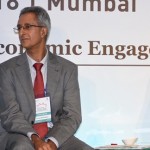Virpratap Vikram Singh (GH): The Blue Economy is an area of potential economic growth for both India and Canada. What are the best practices for achieving this sustainably?
Cyrus Rustomjee (CR): The Blue Economy is really a very exciting area of developmental policy work globally for both advanced and emerging economies, and for the poorest developing countries, particularly those facing insecurity in food and energy and trying to find ways to diversify and eradicate poverty. My work has typically been in the blue economy in small states and in African countries where exciting opportunities exist in various sectors.
For example, fisheries and aquaculture projects in developing countries are providing employment, generating food security, and enabling countries to increase their supply of protein which is vital for human health. They are also increasingly fostering partnerships with other countries for the supply of fish for export.
Marine renewable energy is another promising area. Countries that have been dependent on fossil fuel energy are finding now that there are huge opportunities in switching from fossils to marine renewable energy – that is, energy from the waves and wind. Mauritius and Seychelles, for example, are finding path-breaking new technology to switch to new forms of energy.
Maritime and coastal tourism too are other areas in which countries can start a process of diversification, look at specialisation and high value-added output. In deep sea bed mining, technologies are advancing greatly. Earlier, technology allowed for deep sea mining at a level of about 1 km. Now, new robotic technology allows for deep sea mining up to 3 km, opening vast new tracks of the ocean floor for exploring the mineral resource wealth there.
The exciting aspect of this is that it is enforcing a new form of discipline in planning because historically, human development has been terrestrial, except for countries that are island economies whose DNA comes from the maritime sector. It is enforcing coordination, long-term planning, strategic foresight — concepts that are forcing advanced countries to think in a much more strategic and interlocking way about resources and their prioritisation.
It’s an exciting field — and there are lessons to be learnt by small countries, by developing countries. India is on the pathway. It announced the Sagar Mala Project, which has crucial ingredients for the development of a blue economy, all using and building on the same type of principles I have mentioned.
GH: The oceans are considered a global common where not only businesses see opportunities, but governments too in terms of geopolitics and security. How can policy makers resolve this juxtaposition?
CR: It is a question that every country and region developing its blue economy is facing and trying to resolve. From my own work in developing countries, I find that this is not a juxtaposition at all, but almost like a triple helix, in some respects, three processes occurring simultaneously with varying degrees of priority. They are:
- how do you achieve growth and economic development from the Blue Economy?
- how do you conserve the ocean’s resources?
- how do you protect and secure the ocean’s resources so that they can be utilised?
These are self-reinforcing words that point to a course of action that has often been one of dichotomy and clashes. But it goes without saying that you cannot have a successful blue economy if you cannot protect your marine environment or conserve resources. And you cannot conserve if you do not have economic opportunities from the ocean. So, they all go together.
The challenge has been that progress in the three areas has differed from region to region and in finding ways to harmonise the process between them. Africa, in particular, is finding formulations to bring these three into greater harmony and, in some sense, settle this juxtaposition and reaffirm that it is an integrated process.
Cyrus Rustomjee is Senior Fellow, Global Economy Program at Centre for International Governance Innovation, Canada.
Virpratap Vikram Singh is former Digital Media & Content Manager at Gateway House.
This interview was exclusively conducted for Gateway House: Indian Council on Global Relations. You can read more exclusive content here.
For permission to republish, please contact outreach@gatewayhouse.in.
© Copyright 2018 Gateway House: Indian Council on Global Relations. All rights reserved. Any unauthorized copying or reproduction is strictly prohibited.


